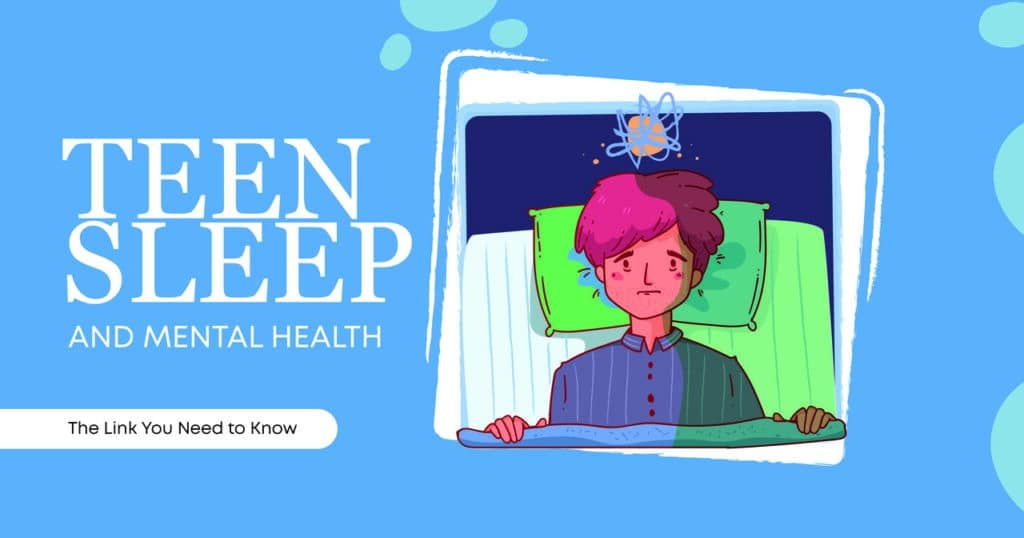Let’s get real here: teens and sleep don’t always mix. Whether it’s the last hours of homework, scrolling through TikTok till the wee hours of the morning, or juggling extracurriculars, a modern teen’s sleep schedule is a far cry from perfect. But there’s more to this than just waking up groggy.
Essential Takeaways
- Sleep is essential to mental health. Teens should get 8–10 hours of sleep at night as an investment for emotional resilience, stress management, and general mental well-being.
- Amounts of screen time affects the quality of sleep. Minimizing the usage of screens before bed maximizes sleep quality since it ensures that the brain produces melatonin, which will help with better sleep.
- A regular bedtime routine and an environment conducive to sleep-ideal, cool, dark, and quiet can also be a difference-maker in terms of improving teen sleep and mental health.
Did you know that sleep plays a really important role in adolescent mental health? Indeed, the connection between sleep and mental well-being is considered so important that getting the right amount of rest can help teens manage stress, improve their mood, and even do better in school.
This post will break down the relationship between sleep and mental health in teenagers, why it matters, and what you can do to make sure that your teens get enough rest.
Why Sleep Is Essential for Teenagers
The Role of Sleep in Teen Development
During this period, teens are still growing in terms of their brains and body. When teens get enough sleep, this is what helps them process information in their brains for that day, store memories, and support their decision-making abilities. It is also during these times that the body releases growth hormones to repair tissues and build the muscular system. So when that teenage person doesn’t get enough sleep, it’s not just the energy levels affected, it’s their whole development.
But beyond growing their bodies, sleep is also critical for regulating emotions. You might have noticed how moody teens can be (well, we’ve all been there). A huge chunk of that is due to sleep. When well-rested, teens are better at handling stress, regulating emotions, and staying mentally resilient.
How Much Sleep Do Teens Need?
The big question: How much sleep do teens need? Experts, naturally, say that 8-10 hours of sleep is enough for school-going teenagers. Reality catches up very differently; few teens ever get anywhere close to this amount.
There are many different reasons for this. First, there’s the school schedule. Early start times make it difficult for teens to get enough sleep, especially with homework or late-night activities. Then there is social life, sports, or extracurriculars that keep bedtime even later. And we can’t forget technology: lots of texting, gaming, or streaming on devices can keep teens awake very late at night.
So, though the recommendation is 8 to 10 hours of sleep, studies show that most teens are getting only about 6 to 7 hours of sleep, and sleep deprivation can have a big impact on their mental health.
The Link Between Sleep and Teen Mental Health
How Lack of Sleep Impacts Mental Health
You might have that fuzzy feeling about being sleep-deprived-everything feels a little tougher. Multiply that with all the pressures of high school on top of that. Sleep and mental health are closely associated, and when teens don’t get enough sleep, it only makes their emotional and mental health that much harder to manage overall.
Mental disorders have symptoms that may be triggered or worsened by sleep deprivation; these include anxiety and depression. Teens who do not get enough sleep will most likely experience overwhelming emotions such as irritability or hopelessness.
It has also been established from various studies that teens who sleep for less than 7 hours a night are at an increased risk of developing some mental health issues. This is because sleep controls the brain in mood regulation and emotional processing. Lacking appropriate sleep further complicates matters, because the teen becomes even less capable of dealing with stress, managing his or her emotions, and being rational.
Why Sleep Deprivation Increases Stress and Anxiety
It’s not just a mood, this alters how the teen’s brain reacts to stress. When a teenager is not getting sleep, the body begins to overreact in the amygdala, which is the part of the brain governing stress. Now, what might otherwise have seemed a quaint problem bad grade on an assignment, or a disagreement with a friend is gigantic and unconquerable.
A lack of sufficient sleep makes teenagers liable to anxiety and work themselves up more easily. They may also take longer to recover from stressful events; hence, they can fall into a cycle of anxiety and inadequate sleep. That’s why more sleep for teenagers reduces their stress and anxiety dramatically, allowing them to feel more in control of themselves.
Signs of Sleep Deprivation in Teens
Behavioral Signs
Sleep deprivation does not necessarily manifest itself in the form of yawning or appearing tired. Often, teens who sleep less than the required hours will exhibit other behavioral changes that might easily go unnoticed, especially if mistaken for other problems.
Some common behavioral manifestations of sleep deprivation in teens include:
- Irritability. Teens who are not getting enough rest are more likely to have mood swings and short tempers. If they act crankier or more easily frustrated than usual, that may be a sign of insufficient sleep.
- Difficulty Concentrating. Teens who are inadequately rested tend to be inattentive at school, tune out during conversations, or forget things easily. Their brains just can’t process any more information because they’re too tired.
- Loss of Motivation. Sleep deprivation can make teens lack the energy or motivation to do much of anything and result in a “why bother” attitude about schoolwork or activities they used to enjoy.
- Withdrawal from Social Activities. When teens are so exhausted, they just stop hanging out with friends or doing extracurriculars because they do not have enough energy.
Physical Symptoms
Apart from behavioral signs, sleep deprivation also manifests in physical symptoms. At times, they can be ascribed to other diseases, but in some cases, they directly speak of the lack of rest.
Some common physical symptoms of sleep deprivation in teenagers include:
- Headache. In most cases, sleepiness causes tension headaches, especially in teenagers.
- Lack of Concentration. Teens who do not sleep properly may even complain that they fail to see things for a certain period because their vision is foggy.
- Persistent Fatigue. Even after what appears to be a full night’s sleep, sleep-deprived teens are likely to be tired throughout the day.
- Increased Illness. A weakened immune system due to lack of sleep leaves the teen more susceptible to catching colds, flu, and other illnesses.
Impact of Sleep Disorders on Teen Mental Health
Common Sleep Disorders in Teens
Teenage sleep disorders are not infrequent; however, most remain undiagnosed. A teen who cannot fall asleep or stay asleep night in and out has almost certainly got a sleep disorder.
Some of the most common sleep disorders of teenagers include the following:
- Insomnia. The inability to fall asleep or stay asleep leaves teens completely drained, despite spending several hours in bed.
- Sleep Apnea. A condition when a person’s breathing stops and starts repeatedly while asleep, causing sleepless nights, followed by daytime exhaustion.
- Delayed Sleep Phase Disorder (DSPS). A situation in which teenagers take more extended periods to fall asleep and get up compared to what is expected, hence making them sleep up until an exceptionally late time and fail to wake up early in the morning to go to school.
How to Identify Sleep Disorders aAmong Teens?
It is pretty challenging to establish whether it is some normal teenage behavior or if it is something serious considering sleep issues in teenagers. Here are some hints that sleep disorder may be affecting their mental health:
- Chronic Tiredness. If your teenager is always tired, even on weekends or after getting extra rest, it might be a sign of a sleep disorder.
- Difficulty Falling Asleep. Both a sleep disorder like insomnia and a circadian rhythm disorder like DSPS often involve frequent frustration in falling asleep even for a tired person.
- Nighttime Waking. If your teen wakes throughout the night and does not return to sleep, it may be a marker of sleep apnea.
If you suspect a sleep disorder may affect your teenager, you should consider consulting a professional. A doctor or a sleep specialist can further diagnose the problem and suggest ways through which their rest can be improved.
Tips for Improving Sleep in Teens
Establishing a Healthy Sleep Routine
One of the best ways to get teens to sleep more is to institute a sleep routine. This doesn’t need to be too fancy, a few small adjustments can make all the difference.
- A Consistent Bedtime. Ensure your teens are going to bed and waking up at about the same time every day, even on weekends. The fact their body has an innate clock will improve significantly due to such a routine.
- Create a Calming Pre-Sleep Routine. Suggest activities that will relax the teens, such as reading, bathtime, or soft music before bed.
Reduce Nighttime Screen Use and Technology
Screens are among the biggest culprits when it comes to sleep. Blue light from cell phones, computers, and iPads disrupts the body’s internal clock by interfering with the melatonin hormone responsible for inducing sleep.
Here are a few tips that might help you limit bedtime screen time for teens: Set Screen-Free Zones Consider declaring the bedroom phone-free after a certain time or challenging your teen to put their phone outside the room as they go to sleep. Use Night Mode Many devices have a night mode that limits how much blue light they emit. This is helpful if your teen needs to access a device before bed.
Encourage Relaxation Techniques
Encouraging teens to unwind before bedtime makes it easier to sleep. Get them motivated to try some of the following techniques:
- Deep Breathing Exercises. Slow, deep breaths will calm the nervous system and relax the body in preparation for sleep.
- Meditation or Guided Relaxation. Apps like Headspace or Calm offer guided meditations designed to relax users and send them off to dreamland.
- Journaling. Writing down thoughts or concerns before bed may help the child clear their mind, so they do not reflect on them until bedtime.
How Parents and Educators Can Support Teen Sleep Habits
Creating an Environment That Supports Sleep
Parents can begin by establishing the foundation for a good night’s sleep with an environment that promotes rest. Some ideas include:
- Maintain a Cool, Dark Bedroom.
- Maintain Healthy Boundaries Around Sleep.
One of the most challenging issues with teenagers is establishing healthy sleep boundaries, in that these adolescents often have too many competing distractions. Parents and educators are the ones who can step in and enforce healthy boundaries:
- Reasonable Bedtimes. Enforce a time when lights have to be off and encourage winding down before bedtime.
- Limit Noise. Consider white noise machines or earplugs if the teen’s room is noisy.
- Minimize Nightly Activities. At night, it’s wise to outline and schedule activities and study sessions so as not to interfere with sleep.
The School’s Role in Supporting Teen Sleep
Schools also play a huge role in supporting teen sleep habits. While early school start times make it difficult for teens to get adequate sleep, schools can be supportive in other ways:
- Educate Students About Sleep. Schools can educate the need for sleep and how it is important for your mental health.
- Balance Workloads. Encourage a more balanced workload and provide breaks at school to lighten the stress load and promote better sleep.
Long-Term Benefits of Prioritizing Sleep for Mental Health
Improved Emotional Regulation and Mental Resilience
Teenagers sleeping well are normally better prepared for the ups and downs of life. They then handle stress more effectively and regulate emotions so that bouncing back from a challenge is much easier. Over time, this forms the basis of good mental health habits, which, sustained into adulthood, will ensure that they have emotional resilience.
Enhanced Academic Success
Not only is emotional health better with quality sleep, but so is academic performance. A well-rested teen is sharper, retains more information in memory, and performs better at school. In turn, when teens consistently get enough sleep, they tend to do better in their studies, thinking of themselves as stronger.
Better Relationships and Social Connections
Sleep-deprived teens tend to become irritable and withdraw. They can even stress their family and friends’ relationships. When sleep is adequate in teens, then they tend to be more patient, effective communicators, and more likely to interact positively with those around them. This will give them stronger social bonds and a more supportive environment.
Make Sleep a Priority for Better Mental Health
Sleep is not just being rested-it’s the basis of well-balanced mental health. If you or the teens in your life are having trouble sleeping, now’s the time to get them to rest so that they can succeed mentally, emotionally, and physically. Healthy sleeping habits, fewer hours in front of screens, and a restful environment will give teens the rest necessary for being successful in all areas: mentally, emotionally, and physically.
FAQs
- How much sleep do teenagers need?
Teenagers need 8 to 10 hours of nighttime sleep to ensure the adequate development of the physical, cognitive, and emotional self. However, most teenagers can sleep only 6 to 7 hours, thus intensifying their mental health problems.
- How is sleep deprivation impacting a teenager’s mental health?
Lack of sleep triggers more anxiety and stress and causes depression among teenagers. It influences the brain not to handle emotions, thus making it hard to deal with difficult times and even increasing the stress process.
- What are some common symptoms of sleep deprivation among teens?
Some of the symptoms include restlessness, unable to concentrate, lack of motivation, frequent headaches, long periods of fatigue, and a tendency to fall sick very often. If a teen is constantly showing these symptoms, then they are surely not getting adequate sleep.
- The most common disorders that occur in sleep among teenagers
Teenagers are usually susceptible to various sleep disorders, such as insomnia, sleep apnea, or DSPS, which can profoundly affect the quality of their sleep and health.
- How can I make sure my teenager sleeps better?
You can help promote a regular sleep cycle by reducing the number of screens in front of people before they sleep, encouraging a sleep-friendly environment, and teaching relaxation skills such as deep breathing or meditation.




